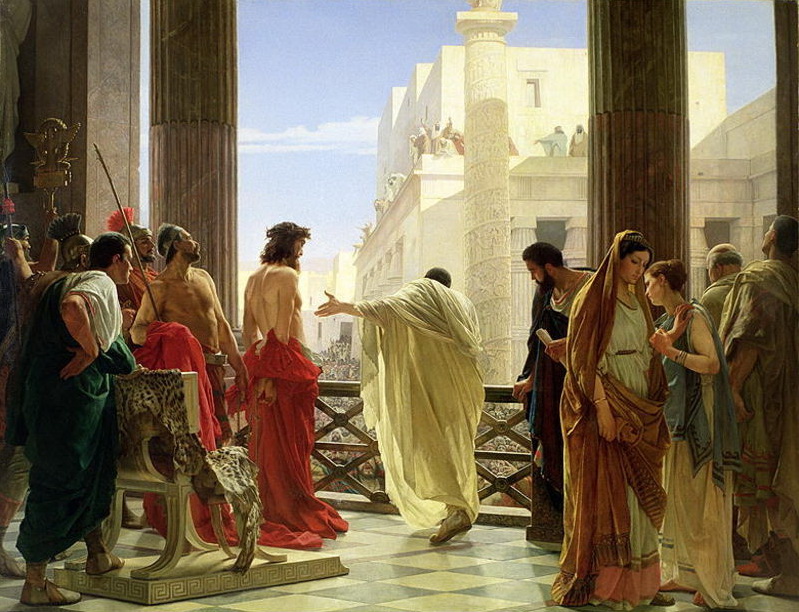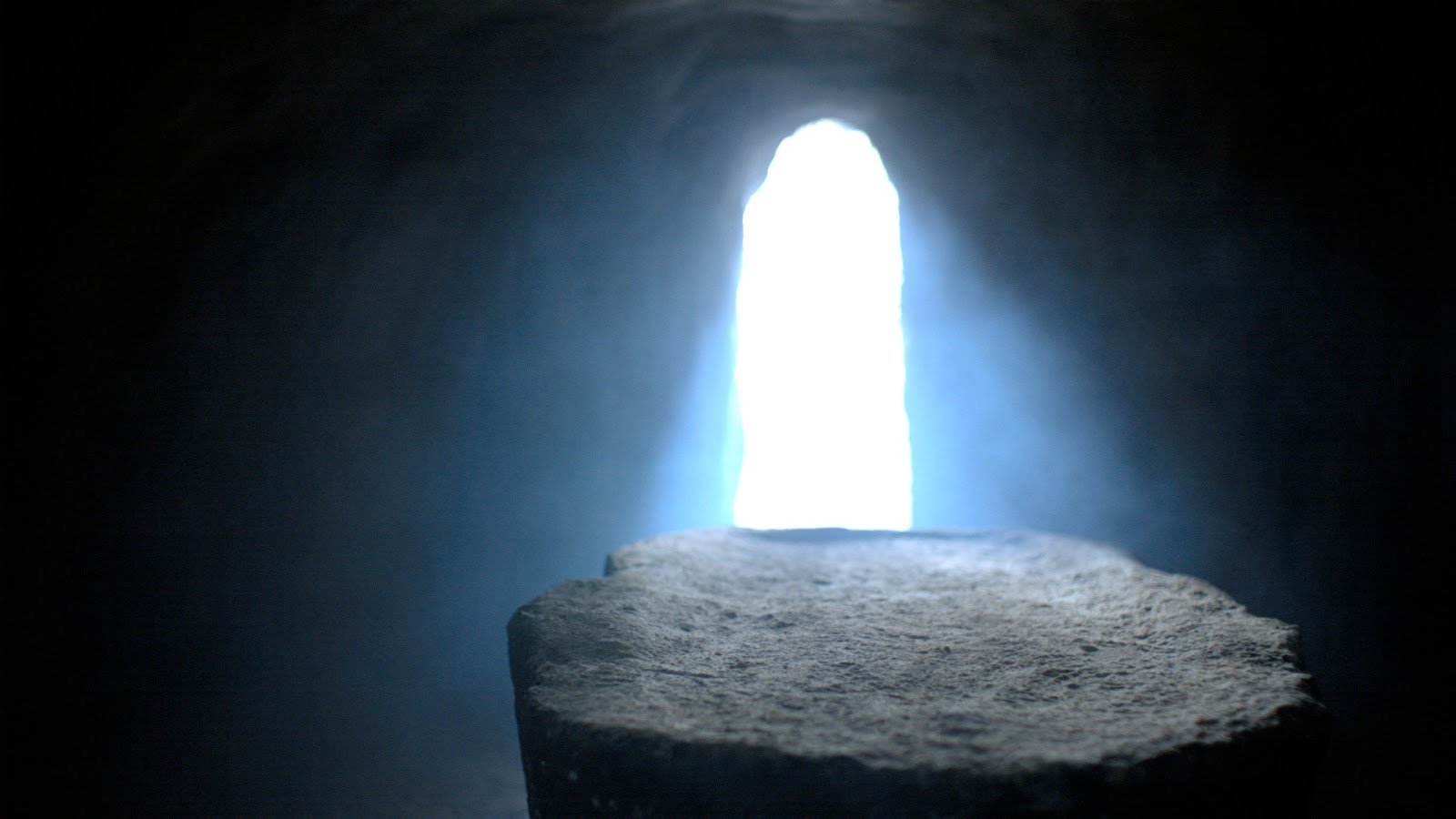The Complete Death and Total Destruction of Jesus Messiah

PONTIUS PILATE washed his hands of the entire affair. The trial of Jesus had likely been conceived by all parties involved, both His accusers and authorities, as a kangaroo court. Jesus was a non-citizen of Rome, which entitled him to no rights before the law to speak of. His accusers therefore were emboldened with the hope that their Passover trial, what we might call “the State vs the Son of God,” would prove a swift and standard affair. And yet when it came to convicting Jesus, Pilate found no evil, nor cause of death in him. The apostle John has the prefect of Judea standing alone and face to face with the Son of God in the inner-cave, his praetorian. Here we see a man swimming in the unexpected tide of truth, completely enveloped by the light of this world, while outside stand the Jews willfully clinging to the darkness of their ignorance, refusing to enter.
It is there in the praetorian where light and darkness explained themselves to each other. That Pilate should repeatedly travel back and forth between the two, Jews to Jesus, darkness to light, ignorance to truth, struggling with a leg cramp of indecision among the two clashing kingdom currents, is unexpected protocol for any Roman trial. Truth or beauty—would he, could he forsake the fragrance of power and the momentary wisp of glory in which the secular power of the state, the material world, and the ever-persistent darkness of ignorance offered him, if it meant bowing to the holy and unsettling embrace of God? In his Gospel, Mark employed the Greek word thaumazein to describe Pilate. Essentially, the governor was surprised and awestruck with wonder, plagued with fear and respect. It was as if Pilate had awoken to, and must contend with, the presence of a heavenly angel.
When he sat down upon the judgement seat, his wife sent unto him, saying, “Have nothing to do with that just man, for I have suffered many things this day in a dream because of him.”
“I will therefore chastise him,” he told the crowd, “and let him go.”
But the darkness which put the light of the world on trial spoke with insistent voices. They wanted Him crucified. More precisely, the Gospel of Matthew records, “But the chief priests and elders persuaded the multitude that they should ask Barabbas, and destroy Jesus (Matthew 27:20).”
In the end Pilate became all men in every age who look upon the sacrificial Lamb of God, deliberated the pros and cons in his mind, and ultimately seared his conscious of Truth. The Gospel of Mark documents the exact time of the Saviors crucifixion—about 9 o’clock—the very hour of the Passover sacrifice. A sin offering dealt with sin in the manner of its death. For this reason the sacrificial animal had to be destroyed in order that the sin which it embodied, the sin of the offeror, might be equally destroyed. In this manner, Christ became nothing. The Gospel of Luke records: “And Pilate gave sentence that it should be as they required. And he released unto them him that for sedition and murder was cast into prison, whom they had desired; but he delivered Jesus to their will (Matthew 23:24-25).”
Jesus was destroyed.

NOW FROM the sixth hour until the ninth hour, precisely 12 noon until 3 pm Judea standard time, Matthew records darkness over the whole land while Jesus hung on the device of His crucifixion. It was about the ninth hour, he wrote, when Jesus cried in a loud voice: “Eli, Eli, lama sabachtani?” That is to say, “My God, my God, why hast thou forsaken me?” The syllables which proceeded from His mouth contain within them perhaps the most difficult words in all of Holy Scripture to comprehend. The perfect union which had bonded Yahweh with the Angel of Yahweh, Father and Son, since before creation or time even began—the very divine Person who once stood before Moses in the burning bush; who before that broke bread and ate meat with butter and bread before his friend Abraham; who wrestled with Jacob; and who later led the Israelites across the wilderness—was severed.
Jesus had not yet succumbed to physical death. That moment would soon arrive. But that is not to say He hadn’t yet already tasted death, because at present, Jesus experienced another sort of death altogether. It was the immediate death of Adam and Eve after they ate the forbidden fruit which He Himself tasted. Like Adam before Him, He died two times.
The Apostle Peter would later claim: “He Himself bore our sins in His body on the tree (1 Peter 2:24).” The prop which would serve as a Roman crucifixion device, and as a symbol for atonement, was no accident, for it is a tree which equally served as the prop and symbol of sin itself for all humanity. Genesis records of this tree.
“And Yahweh God [elohim] commanded the man, saying, Of every tree of the garden thou mayest freely eat: But of the tree of the knowledge of good and evil, thou shalt not eat of it: for in the day that thou eatest thereof thou shalt surely die (Genesis 2:16-17).”
The Hebrew word muwth (pronounced “mooth”) indicates that something either already has died or will die, or that an act of killing is being committed. There is no preference here between man and animal. As we shall come to learn, the soul (nephesh) resides in everything that has a spirit (ruah), the breath of life. Both man and animal die the same death.
Consider the following.
“The fish in the Nile will die (muwth), and the river will stink; and the Egyptians shall lothe to drink of the water of the river (Exodus 7:18).”
“But Nadab and Abihu died (muwth) before the LORD when they offered strange fire before the LORD in the wilderness of Sinai (Numbers 3:4).”
In Genesis 2:17 muwth is employed twice. One might therefore phrase it as:
“…for in the day that you eat of it you shall die die.”
Rather that translating muwth twice, the 1611 King James translators understood this to mean an extra emphasis on that promise of death was needed, and therefore stressed that Adam would “surely die.” Half a century earlier, the Geneva Bible had translated the double usage of muwth in Genesis 2:17 as:
“…for in the day that thou eatest thereof, thou shalt die the death.”
The emphasis here is that his death would be promised future-tense, not immediate. And yet it also seems understood by all involved that Adam was on an irrevocable path of certainty. Surely, as the King James translators had implied it, he had begun the journey towards death. Immediately afterwards, Yahweh told Adam: “By the sweat of your face you will eat bread, till you return to the ground, because from it you were taken; for you are dust, and to dust you shall return.” This is not however to be confused merely with a spiritual separation, as many claim. If God had intended to warn Adam that He would separate, He would have employed the Hebrew word badal (baw-dal’). There is another, and I think many to most will agree, far more literal way of reading muwth into Genesis 2:17.
The Young’s Literal Translation, first published in 1862, some two decades before Westcott and Hort first translated the New Testament Greek from the Codex Sinaiticus and Codex Vaticanus, most clearly indicates the process of dying with the words, “dying thou dost die.”
“…for in the day of thine eating of it—dying thou dost die.”
Adam did die that very day. He lost his immortal nature—which is to say the death of his immortal nature was merely the consequence of a much deeper death—spiritual death. The spirit (ruah), first breathed into his nostrils, was dead to God. Tragically, Adam had fallen out of relationship with Yahweh. Despite the wealth of hidden knowledge which his descendant would later claim, it was of no use to them. They were spiritually dead.
This is why Jesus told the woman at Jacob’s Well, “God is a Spirit: and they that worship Him must worship Him in spirit and in truth (John 4:24).”
He died two deaths that day on the tree. He died a spiritual death, and then, only moments later, a physical one. He died so that we might live.
For Jesus, it would be His last parable.

CONFUSION OFTEN surrounds the similarities between soul and spirit, and yet the Bible gives us a clear distinction. If the theologian has his way, Christ’s conscious ghost immediately left His body at the cross. Whether He ascended or descended to heaven in the interval between His bodily death and resurrection—or moved, independent of the body, to the left or the right of the cross—is therefore the subject of much debate. This is due to the fact that the Bible makes no assertion whatsoever that He even had consciousness to contend with. Confusion assuredly arises whenever Greek and Alexandrian wisdom holds hand with straightforward doctrine. The Platonist diligently seeks the slightest suggestion of the immortal soul and yet, if the Gospel and Epistle writers did not think the extracurricular whereabouts of his soul important, it is simply because such a concept was not even within the grasp of their reasoning. For the first-century Christian, the Savior had only one destination.
Jesus was laid in a tomb.

The Hebrew word ruach is translated “spirit,” “breath,” “spirit,” “ghost,” or “wind.” This is consistent with the idea that the spirit [ruach] is a wind or a breath from God. The Greek word [pneuma] is equivalent to the Hebrew word [ruach], and can be traced over four-hundred times in the Old Testament. Already by the second verse of Genesis we read that “the earth was without form, and void; and darkness was upon the face of the deep. And the Spirit [Ruach] of God [Elohim] moved upon the face of the waters.”
Man’s spirit and soul are both described in Genesis 2:7, and cleverly wedded together, when Yahweh “formed man of the dust of the ground, and breathed into his nostrils the breath [ruach] of life; and man became a living soul [nephesh].” Just consider this prodigious fact. The very breath we breathe, lungs to nostrils, originated from the divine—the one God of Israel. Should that not cause us to stumble over our own breath and gasp in exaltation? It is for this reason alone that we owe Him our fullest allegiance. For the Hebrew, this was an explicit truth, which Moses later rephrased when he affirmed that Yahweh was “the God of the spirits of all flesh (Numbers 27:16).” And yet the anthologies of human history, as we well know, are an ominous read—filled with dark speeches. The men and women who were intended to represent themselves as God’s imagers on earth did not consider their very breath to be a moral obligation. It would take floodwaters “to destroy all flesh, wherein is the breath [ruach] of life, from under heaven” so that “everything that is in the earth shall die (Genesis 6:17).” Afterwards, God remembered Noah and his family, “and God made a wind [ruach] to pass over the earth, and the waters aswaged (Genesis 8:1).”
The children of Abraham, at least, those who subscribed to the true saving faith, likewise understood the exhilarating fact that the very breath in their nostrils was an inheritance from Adam, ultimately from God, and was therefore on loan. We need only look back once more upon Job, who declared:
“You have granted me life and lovingkindness;
And Your care has preserved my spirit.”
(Job 10:12)
Job’s spirit was preserved by God. He would further add:
“All the while my breath is in me,
and the spirit [ruah] of God is in my nostrils…”
(Job 27:3)
The book of Job aims to educate the reader of Scripture in elementary knowledge. Job’s godly friend Elihu would likewise add:
“The Spirit [ruah] of God has made me; the breath of the Almighty gives me life (Job 33:4).”
Though it is true that the Creator has faithfully preserved our spirit, if God should set His heart upon the matter, Elihu made known, He could gather to Himself His spirit and breath, and all flesh would perish. Man, he said, his very being, would return to dust.
14 If He should determine to do so,
If He should gather to Himself His spirit and His breath,
15 All flesh would perish together,
And man would return to dust.”
(Job 34:14-15)
So when the Gospel according to Matthew records that Jesus, while hung upon the cross, “yielded up the ghost,” he is keeping in line with Hebrew tradition while making an astonishing claim—which I shall turn to in a moment. To allege however that His spirit returned to God is proof—or rather, the only argument one needs—that we consciously ascend to heaven after we die is also to divorce ourselves from the consciousness of Scripture which preceded the cross.

David understood our separation of spirit from flesh in completely separate terms. The Psalmist wrote:
3 Do not trust in princes,
In mortal man, in whom there is no salvation.
4 His spirit [ruach] departs, he returns to the earth;
In that very day his thoughts perish.
(Psalm 146:3-4)
The worldview of Israel’s greatest king would have us believe that the spirit is not the man. His identity remains with his body, even after his spirit has departed. There is consequently no salvation in mortal man to be had. He returns to the earth, and rather than transferring his consciousness—with a flickering candle among the chilling wisp of the haunted being—into the spirit realm, his very thoughts perish. Why do our Scriptural lecturers persist in telling us the Hebrew writers never aspired to rise above poetic jargon? We can learn much from the shepherd boy. If we allow God’s Word to speak for itself, we will indeed encounter good doctrine.
David’s worldview is rephrased in Psalm 115 with even greater resounding clarity.
16 The heavens are the heavens of the LORD,
But the earth He has given to the sons of men.
17 The dead do not praise the LORD,
Nor do any who go down into silence;
18 But as for us, we will bless the LORD
From this time forth and forever.
Praise the LORD!
(Psalm 115:16-18)
In these three brief poetic verses we learn much of Hebrew thinking—and more earsplitting propositions. It is here, quite astonishingly, where we read that “the heaven—even the heavens—are Yahweh’s.” Rather, it is the earth which He has given to the sons of men. Heaven above is not a prize to be won, nor ours to claim, in this present life or death, because: “the dead do not praise the LORD.”
Rather than buckling to accusations of vernacular metaphors, I take his intentional phrasing to mean, in a straightforward attitude, that “the dead do not praise the LORD.”

His son Solomon would carry on these very Scriptural traditions. He rather famously carved into papyrus the following ink:
“And the dust returns to the ground it came from, and the spirit [ruah] returns to God who gave it (Ecclesiastes 12:7).”
Admittedly, from these few words alone, one might easily conclude that Solomon was swayed by a dualistic education in Greek philosophy. Perhaps this is the reason he is so often quoted by the Platonist (and the Occultist), as though Solomon confessed the hidden knowledge of the Mystery religion hundreds of years before the loose lips of Plato. And yet, had dualism been his intent, when we stop to consider the whole of his Ecclesiastic view, and the theological forefathers which informed his doctrine, he would have employed his own words against himself. Though it is true that the spirit returns to God, Solomon’s intent has long been noted by the scholar. Every spirit returns to God—both righteous and wicked. If, by returning the spirit to God, we are inciting breathtaking flavors of heaven above, then everyone it seems is intended for it. Rather, the breath of life, first exacted into Adam, is on loan to everyone. And besides, Solomon has already instructed us to an inexplicable parallel. Concerning the wind he writes:
“As you do not know the path of the wind [ruah], or how the bones grow in the womb of a woman who is pregnant, so you cannot understand the work of God, the Maker of all things (Ecclesiastes 11:5).”
Furthermore, like David and Job and the whole of Hebrew thinking, the dualism of man is never recognized. When our breath returns to God, who lovingly gifted it for our praise and admiration of Him, our consciousness is not carried with the gale. Solomon further writes:
“For the living know they will die; but the dead do not know anything, nor have they any longer a reward, for their memory is forgotten. Indeed their love, their hate and their zeal have already perished, and they will no longer have a share in all that is done under the sun (Ecclesiastes 9:5-6).”
Reading such confessionals, it would be difficult to calibrate how Scriptural lectures on the afterlife could be made any clearer. This is not ambiguous thinking. The dead know nothing. If the very accomplishments of their life have forsaken them, it is because memory itself is forgotten. With these words, Solomon has taken a dagger to the shroud of Platonism. He literally chokes any hope of posthumous consciousness at the throat. Even the emotions which relate to our sense of self, how we see ourselves and how we think others perceive us, or how we perceive others, are extinguished. These are the biological and metaphysical truths what Solomon intends to relay to his reader when describing our return to the dust of the ground, and it should be noted that Genesis 2:7 mirrors Ecclesiastes 12:7 with astonishing clarity. The former speaks of the creation of man—the first Adam; while the latter describes the de-creation of man. Adam had no consciousness to speak of before his creation. The same can be said of his de-creation.
Adam died. He died—he died—he died. And since we have yet to witness a resurrected Adam once again walking the earth in our lifetime, we can safely assume that our aboriginal forefather is still dead.
There is of course the second Adam to consider. He also died. Suffice to say—when the breath [pneuma] left Jesus’ lungs, the second Adam experienced the de-creation of man.
All four Gospels astonishing concur.
He “yielded up the ghost (Matthew 27:50).”
“And Jesus cried with a loud voice, and gave up the ghost (Mark 15:37).”
“And when Jesus had cried with a loud voice, he said: Father, into thy hand I commend my spirit: and having said thus, he gave up the ghost (Luke 23:46).”
“When Jesus therefore had received the vinegar, he said: It is finished: and He bowed His head, and gave up the ghost (John 19:30).”
The most obvious conclusion to make, Jesus gave up the ghost. To say He “breathed His last” would place a very different emphasis on the fact that, though Jesus surrendered Himself to the cross, the security of His life was always in His hands.
On the night He was betrayed, Peter drew his sword upon the servant of the high priest and slivered off the ear. Jesus rebuked him. He said: “Thinkest thou that I cannot now pray to my Father, and He shall presently give me more than twelve legions of angels?”
Even now as I attempt to picture Jesus on the cross; tormented, broken, bleeding, mocked, spat upon; to even try and grasp the Savior wrestling with the anguish of my sins thrust upon Him by the Father—I shudder to imagine another scenario altogether. That Jesus might simply change His mind and expire of His intended mission, and command His father to dispatch more than 72,000 angels to His immediate aide—that they might pull Him from the cross, restore Him to good health and, right then and there, thrust all of humanity into the fires of Gehenna—is a scenario which Jesus Himself declassified to Peter.
But rather, crying with another loud voice, He gave up the ghost by His own free will—and died. “No man taketh my life from me, but I lay it down of myself,” He said.
The earth itself, apparently, could not contain itself. If Satan and other divine beings who ruled over the earth had grasped for victory by putting the angel of Yahweh into the tomb, they must have been extremely nervous when, almost just as immediately, “the veil of the temple was rent in twain from the top to the bottom,” as Matthew records. This in itself is proof that the mission of Jesus Christ was an instantaneous success. But there mere fact that the earth did quake, and the rocks were split, “and the graves were opened; and many bodies of the saints which slept arose, and came out of the graves after His resurrection, and went into the holy city, and appeared unto many,” must have caused the powers of darkness to tremble with fever.
The gig was up.
Their immortal soul doctrine was a lie, and death itself had begun to reverse itself.

IF THE TRUE sacrificial death of Jesus is unthinkable, it is only because human religion has made it permissible to find dogmatic detours and attain the alternative. That the only begotten Son of God should become flesh, grow and mature as a man, suffer as a man, and die as a man, is stiff doctrine enough. It is often believed however only because it must in order that we participate under the umbrella of the Christian faith. We must therefore not negate the purpose of His death nor underwhelm the spectacular importance of the resurrection to come. To say that Christ’s eternal life began at His death or that He was liberated from the cross immediately after giving up the ghost would be a Gnostic conclusion to make. Without His resurrection to come, there would be no hope—no life after death. And yet, despite a treasure-trove of Scriptural evidence to the contrary, it is the ascension into heaven which most souls are after.
It is the Prophet Isaiah who looked forward to the day when the Savior would “pour out His life unto death,” and in doing so would be “numbered among the transgressors (Isaiah 53:12).” By saying Jesus died, we can rightfully conclude He was destroyed. The Bible exhausts such vocabulary, and it shouldn’t surprise us. Jesus compared His own death to the dissolution of a kernel of wheat (John 12:23-26).
In his book The Fire That Consumes, Edward Fudge writes: “We naturally recoil from such a thought, that the Son of God could truly have perished—even for a moment. Yet is this not the same difficultly we face in accepting Jesus’ true kenosis and humiliation in becoming a man? (Philemon 2:5-10). In the first century the Docetics tried to avoid the implications of saying the incarnate God truly died, but the apostolic witnesses refused to yield an inch (1 John 5:6-10).”
To this day, the true implications of Jesus’ death are not willingly understood nor embraced. The Apostle Paul saw the death of the sacrificial animal as the death of the sinner, that is, the destruction of both the sacrifice and his sin. This is why God “made him to be sin for us, who knew no sin.” Our sin was destroyed with Christ “that we might be made the righteousness of God in him (2 Corinthians 5:21).” Christ Jesus “gave Himself as a ransom for all men,” he wrote to Timothy (1 Timothy 2:5). And to Titus he penned, he “gave himself for us, that he might redeem us from all iniquity, and purify unto himself a peculiar people, zealous of good works (Titus 2:4).” To the Colossians he said: “And you, that were sometime alienated and enemies in your mind by wicked works,” the Apostle Paul wrote, “yet now hath he reconciled in the body of his flesh through death, to present you holy and unblameable and unreproveable in his sight (Colossians 1:21-22).” In slightly other terms, “Christ hath redeemed us from the curse of the law, being made a curse for us: for it is written, Cursed is every one that hangeth on a tree (Galatians 3:13).”
Jesus “was made a little lower than the angels for the suffering of death,” the writer of Hebrews insists, “that he by the grace of God should taste death for every man (Hebrews 2:9).” Likewise, “Christ was sacrificed once to take away the sins of many people (Hebrews 9:28).”
We simply cannot separate Jesus from the complete death and total destruction of the sacrificial lamb. “Christ died for sins once for all, the righteous for the unrighteous, to bring you to God (1 Peter 3:18).” Jesus Christ “is the atoning sacrifice for our sins,” the Apostle John wrote (1 John 2:2). He “laid down his life for us (1 John 3:16).” By doing so, He lost His life rather than loving it so much as to deny the resurrection to come from those who longed for the day of His arrival—from those who loved Him and to this day long for His return.
“Greater love hath no man than this,” Jesus told His loved ones on the night He was betrayed, “that a man lay down his life for his friends.” Jesus died for His friends. It is true that He died for Peter, James, and John, and for Mary and Martha, but He died also for Adam and Enoch, Noah and Abraham, Job and Moses, David and Isaiah. He died for Eve and Sarah, Rahab and Deborah, Ruth and Esther, Bathsheba and Hannah. He died for His friends. He died for them and so many others. He died for those whom He prayed for on the night of His betrayal—the faces that must have swam through His head. “Neither pray I for these alone,” He told the Father, “but for them also which shall believe on me through their word.” He died for those whom He had conversed with and dined with, but also for those whom He longed to converse with and dine with face-to-face, in the church age to follow and the ultimate inheritance of His kingdom to come. Specifically, Israel’s greatest king and high priest who ever lived became the sacrifice for me—and you.
Jesus died because of sin. He died in the place of sinners. But more so—He died the sinner’s death. He died the death required by sin. God “demonstrated His own love for us in this: While we were still sinners, Christ died for us (Romans 5:8).”
The true death of Jesus is an insult to the sinner, and when the totality of his demise is presented, more often than not it is a suggestion for scorn also from among the Christian. The total destruction of Jesus Christ is a notion which John Calvin vehemently objected. For Calvin, it was unthinkable that Jesus’ soul truly died or even slept. And yet the eternal torment of John Calvin makes a gross error. It is without a doubt one of the greatest miscalculations in the history of the church, short of blundering over salvation. For the sinner, the consequence of sin is death—or rather, eternal punishment, not eternal torment. If finite sinners require conscious punishment infinitely—eternally, without end—for justice to be exacted, then Christ did not die the sinners’ death.
In hindsight, the cross is a perfect picture of the consequence for sin—the first and the second death exacted in one grandiose swoop, whereas its agent, our Lord, became the very incarnation of the judgement of God. Jesus drank from the cup of God’s wrath, and in like manner, our rightful end—one in which we will face if we are not found hidden in Christ. For the saved soul, Jesus reversed the order. His sacrifice—His punishment, was sufficient.

UPON HIS OWN death a millennia earlier, King David would, as he himself wrote, “go down into silence.” It is David who once penned: “for there is no mention of you in death. In Sheol who will give you thanks? (Psalm 6:5).” The writer of 1 Kings records: “So David slept with his fathers, and was buried in the city of David.” Exactly fifty days after the feast of first fruits—on the day of Pentecost to be exact, and while standing before David’s sepulcher—the Apostle Peter confirmed the reality of David’s worldview when he proclaimed: “Men and brethren, let me freely speak unto you of the patriarch David, that he is both dead and buried, and his sepulcher is with us unto this day (Acts 2:29).” Peter would take a knife to the fabric of our cognitive dissonance, which separates us from the blunt reality before us (should we employ Platonism as a shroud for our soul), when adding:
“For David is not ascended into the heavens: but he saith himself, ‘The LORD said unto my Lord, Sit thou on my right hand, until I make thy foes thy footstool (Acts 2:34).”
JESUS EXPOSED THE MONEY CHANGERS. AND THEY HATED HIM for it. After fashioning for Himself a scourge of chords, he drove them out of the temple, jangled the coins from their pockets, overturned their tables, and shepherded the sheep and the oxen out with them.
The Jews fumed.
They demanded, “What sign do you show us as your authority for doing these things?”
“Destroy this temple,” He answered them, “and in three days I will raise it up.”
The Jews were naturally confused by this. The construction of Herod’s temple, they said, had taken forty-six years from beginning to end. How could Jesus possibly gift them with a new one in as little as three days? To this inquiry the Apostle John adds as commentary: “But He spake of the temple of His body (John 2:21).”
While it is certainly true that God raised Jesus from the dead, as Peter confessed to the crowd (Acts 2:32), it is also a fact that Jesus Himself was acting to bring about His own resurrection. It is God the Father, Yahweh, who gave Jesus the authority to do so. Jesus said: “For not even the Father judges anyone, but He has given all judgment to the Son, For just as the Father raises the dead and gives them life, even so the Son also gives life to whom He wishes. For not even the Father judges anyone, but He has given all judgment to the Son (John 5:20-22).”
At a later date there was a division among the Jews. Many of them said He was mad, and had a devil in Him. “No man taketh my life from me, but I lay it down of myself,” He told them. “I have power to lay it down, and I have power to take it again. This commandment have I received of my Father.” Others in the crowd insisted, these are not the words of one possessed by devils. Some would add: Can a devil open the eyes of the blind?
During His earthly ministry, Jesus raised four known people from the dead. He raised the widow’s son and the daughter of Jairus. He raised his good friend Lazarus too—after he had been buried four days. But he saved His greatest two miracles for the last.
Jesus raised Himself.
“No man hath ascended up to heaven,” He once told a crowd, “but He that came down from heaven.” And that’s just what He did.
Jesus ascended into heaven and sat at the right hand of God.
*
“SO CHRIST was once offered to bear the sins of many,” the writer of Hebrews says. Pay attention, because where our next meeting with the Messiah is concerned, this is solid Scriptural thinking—and good doctrine. “And unto them that look for Him shall He appear the second time without sin unto salvation.”